
Types of Tournaments: Guide to Popular Competitions
So, you're looking to start a sporting tournament. That's great, but there are a few things you'll need to know about tournament structures and group stages.
You want your team to be able to play against others in an organized manner, but you're struggling to find your footing and get the ball rolling (pun intended).
If that sounds like you, you've come to the right place.
This comprehensive guide will break down the many different types of tournaments to help you find the tournament format that works for you.
👉 Looking for printable brackets for your upcoming tournaments? Check out our free printable bracket tool!
Which is the most popular type of tournament?
As you may already know, there are plenty of tournament types, from the round-robin to double and triple splits.
First, we'll talk about the type of tournament you'll come across the most—single-elimination tournaments.
Single elimination tournament formats are, by and large, the most popular tournament format, and for a good reason.
They're wonderfully easy to organize. The name says it all—if a team loses once in the tournament, they're out for the rest of its duration.
This type works best if you have a shorter time frame to work with and many teams to play.
Single-elimination tournaments don't work well for short games that take just a few minutes to complete, like Arm Wrestling tournaments, for instance.
If your teams are doing any sort of traveling to participate in your tournament, they'll likely want to play for more than 5 seconds.
As you can see, the tournament type depends on the sport.
What sports have tournaments?
There's a tournament for almost every sport in the world, but for this guide, we'll only look at the most popular ones.
1. Soccer/Football - FIFA World Cup
By far, the most popular sporting tournament in the world is the FIFA World Cup, garnering a record volume of viewers and participants every 4 years.
Founded in 1930, FIFA pairs 32 of the best men's soccer teams from each nation against one another in an elimination-style tournament.
More than 3 billion people tuned in to support their favorite teams in the 2018 World Cup.
In 2022, there were more than 5 billion viewers, more than there have ever been in the event's history.
2. Athletics - The Summer Olympic Games
We're all familiar with the Summer Olympics, or what most of us just call The Olympics.
It's a global sporting competition where every country can showcase its best athletes in a variety of events.
The first Summer Olympics of the modern era was held in 1896 in Greece.
The Summer Olympics takes place every 4 years, with a different country hosting each time.
A nomination to be a host country is a big deal, thanks to the millions of supporters that the event attracts and the inevitable boom in tourism for the host country.
3. Cycling - The Tour de France
The Tour de France sees the world's most talented cyclists compete against one another in one lengthy race spanning several weeks.
The first competition involved 60 European cyclists and occurred in 1903, more than a century ago!
The Tour de France of the 21st century sees riders from around the world competing together in teams.
Every year, the event brings in an estimated 3 billion supporters who tune in for at least 1 minute of watch time.
That's an impressive statistic for a less-popularized sport like cycling.
4. Cricket - The ICC World Cup
The ICC Cricket World Cup, like the FIFA World Cup and Olympic Games, takes place every 4 years.
Cricket is one of the world's most-watched sports, and its premier worldwide tournament attracts more than 6.5 billion viewers.
The first of its kind occurred in England—the birthplace of cricket—in 1975, with the West Indies taking the cup.
So far, Australia has been the most successful national team, winning the ICC 3 times in a row in 1999, 2003, and 2007.
5. Rugby - Rugby Union World Cup
Like other world cups, the Rugby Union hosts its World Cup every 4 years. This competition sees 12 of the world's best rugby teams competing for the cup.
The tournament was created in 1987. New Zealand was the Rugby Union World Cup's first-ever winner.
The New Zealand Rugby Union National Team is tied for being the most successful team internationally, having taken 3 World Cup victories.
South Africa has also won the cup 3 times. In 2019, more than 857 million people tuned in to watch the tournament.
Round-robin tournament

Round-robin tournament formats involve all teams playing each entry an equal number of times.
These formats also use fixed schedules in which all teams know precisely who they're playing against and when they're playing.
This offers some unique advantages in helping teams prepare for upcoming games.
When working with a small number of teams playing fairly quick matches, round robin scheduling comes in handy for 1-day tournaments.
When games take longer to complete, and there are more competitors at play, the round-robin tournament format is best suited for league play.
1. Round robin double split
Round-robin double-split tournaments come in handy when the round-robin format is preferable, but the amount of teams playing is too large.
By dividing the entries into 2 divisions, you have a practical, simple solution.
After playing within the divisions, only the top two teams from each division will participate in play-offs to determine the final top standings.
This offers many obvious benefits—for one, the number of games is halved.
However, one drawback to this round-robin tournament format is that accurate seeding becomes important.
2. Round-robin quadruple split
This league format aims to solve the same problems addressed in the double-split format. However, rather than splitting the teams into 2 groups, they are divided into 4 groups.
This round-robin format only comes in handy when the number of teams playing in the league exceeds 11.
Read More: 6 team league generator. See step-by-step how to use Diamond Scheduler to generate a schedule for a 6-team league.
Single elimination tournament

The most appealing factor of the single-elimination tournament lies in its simplicity.
The losing teams are eliminated from the tournament, while the winning teams progress to the next rounds until just one team remains. That team becomes the champion of the tournament.
This format is ideal when working with many teams, a short time frame, and a limited arsenal of playing locations.
Of all the tournament formats, a single elimination tournament requires the least matches to be played.
Perhaps the most effective use of this format is play-offs at the end of a season or after a long tournament. You would hold the single elimination seeding at the end of the previous playing period.
Moreover, half of the competing teams would be eliminated after just 1 game in this format. Only a quarter of the original number of teams would remain past the second round.
When you're looking for more extensive participation from your teams and have more time for teams play and available suitable locations at your disposal, single-elimination tournaments are not the best pick.
Sure, it's the simplest format, but the other tournaments mentioned in this guide are also fairly simple to organize. The simplicity of single elimination is not a significant factor in its favorability.
Read More: Benefits of competitive sports. We explore the many benefits of competitive sports for kids, youth, and adults!
Double elimination tournament

Two problems exist in the single-elimination format that double-elimination tournaments address.
In the single-elimination format, the best entries may have a subpar first match and thus be badly seeded in the draw.
A losers’ bucket allows each team to play in the finals in a double-elimination tournament.
Another problem with single-elimination tournament formats is that half the entries will only get to play 1 game. With double elimination, each team can play a minimum of 2 games.
This format, however, often receives a measure of overrating because of the strengths mentioned above.
It does have its weaknesses, and some alternatives may suit you better. The most prominent challenges with double eliminations are that the 2nd and 3rd teams to be seeded play far more games, which take more rounds to finish.
A double elimination also makes inefficient use of available spaces. For instance, if your league is working with 9 teams and 4 venues are available, playing with the double-elimination format would mean that the tournament would take 7 rounds in total.
This is the same number of rounds as in the previously-mentioned round-robin double split, but without the many advantages that the double split format offers.
What are the steps to use Diamond Scheduler for sports schedules?
We've designed our Diamond Scheduler to make the scheduling process as easy and simple as possible.
For the sake of this article, we'll be scheduling a hypothetical baseball league.
Here's how it works:
Step 1: Choose your starting point
To begin scheduling, determine how you will input your league information into our templates.
Your options include the following:
Importing From SportsEngine
Starting From Scratch
Uploading Formatted CSV Files
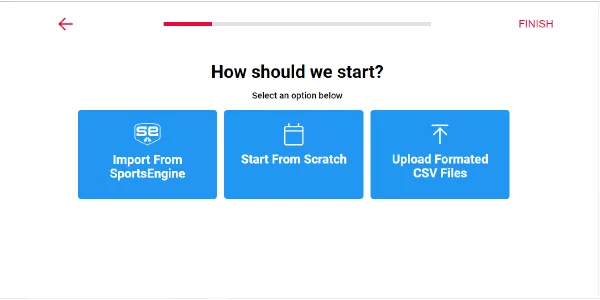
After you've selected an option, you can move on to the next step.
Step 2: Create your league, divisions, and teams
Next, it's time to input your league, season, division, and team details.
By default, Diamond Scheduler allows you to create up to 30 divisions with 30 teams in each division.
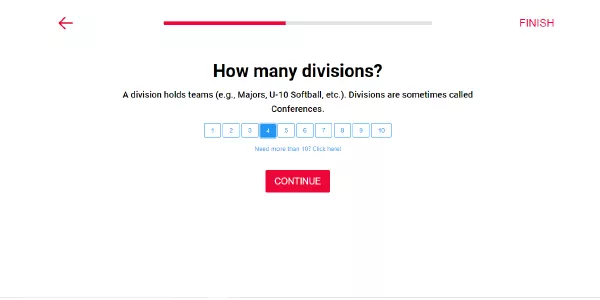
Step 3: Add your venue and fields
We use geolocation to help you find the venue you're looking for. Type in the venue's name, then select it as it appears on the screen.
If it doesn't appear, you can always add the venue manually.
If you use geolocation, we can calculate the distance between venues to set travel constraints for your teams.

Step 4: Add constraints to your teams
Whether you want your teams to rest on certain days or restrict games against a specific team, you can specify the constraints unique to each team under your team settings.
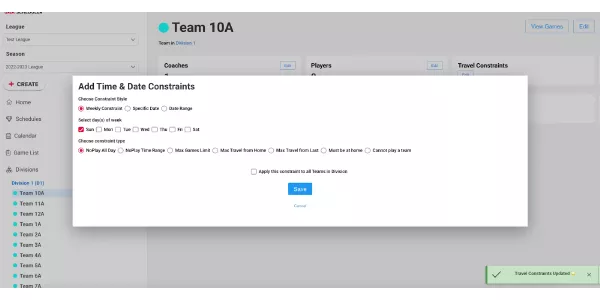
You can set different constraint parameters for weekdays vs. weekends for travel constraints.
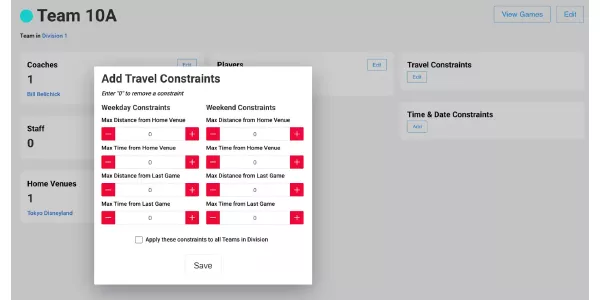
Step 5: Create your timeslots
The most important part of scheduling is ensuring you have the right number of available time slots for your games.
After you've signed up for your free account, Diamond Scheduler allows you to easily create, copy, and modify time slots in the calendar.
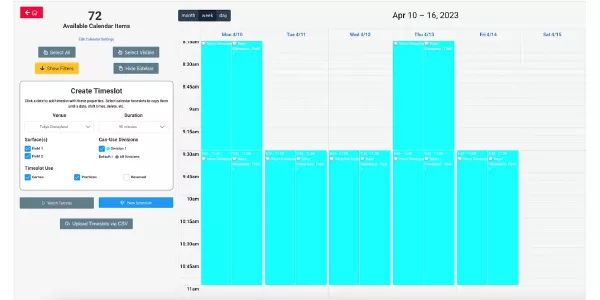
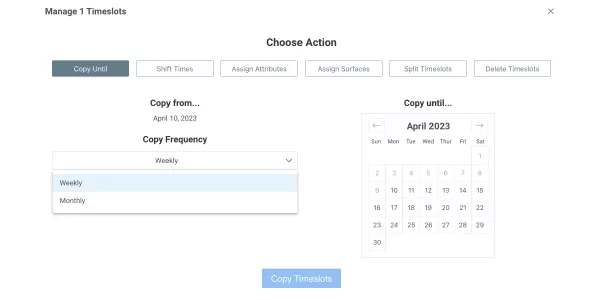
Step 6: Schedule your games
Now that your constraints and time slots are ready, you can finalize your schedule type and dates.
Hit "schedule," grab a beverage, and come back to your schedule all ready for you!
If you spot any mistakes, don't worry. Nothing is set in stone, and you can always make any necessary adjustments to your schedule before finalizing and distributing it.
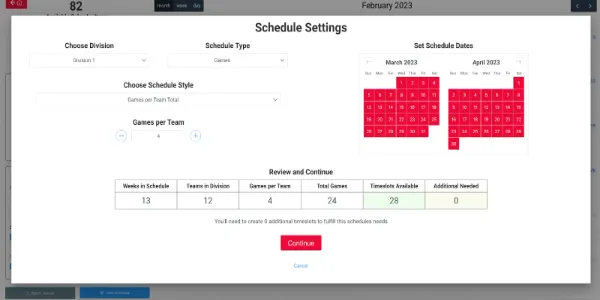
You can also check out our article on How to Create an 8-Team League Schedule for more tips and tricks!
Closing thoughts
It's clear to see that there is a wide range of tournament formats available for you to take advantage of.
While each offers specific benefits and drawbacks, it's important to use the best format that suits your league setup.
Don't fall into the trap of opting for the one that seems simplest to plan. The best leagues are planned meticulously, not just for the players but also for the organizers.
Be sure to consider the number of teams you're working with, the available venues, and the duration of your game's matches. Some formats are best suited to matches that take less time to complete, while others are great for long-form sports.
Thalia Oosthuizen has been writing in a professional capacity for over a decade. Her love for sports has led her down the path of sports writing, where her passion and skills combine. Thalia is a runner, cyclist, and swimmer, and enjoys playing tennis and hockey. Her favorite sports teams include Chelsea F.C. and the Georgian Lions Rugby Club.



